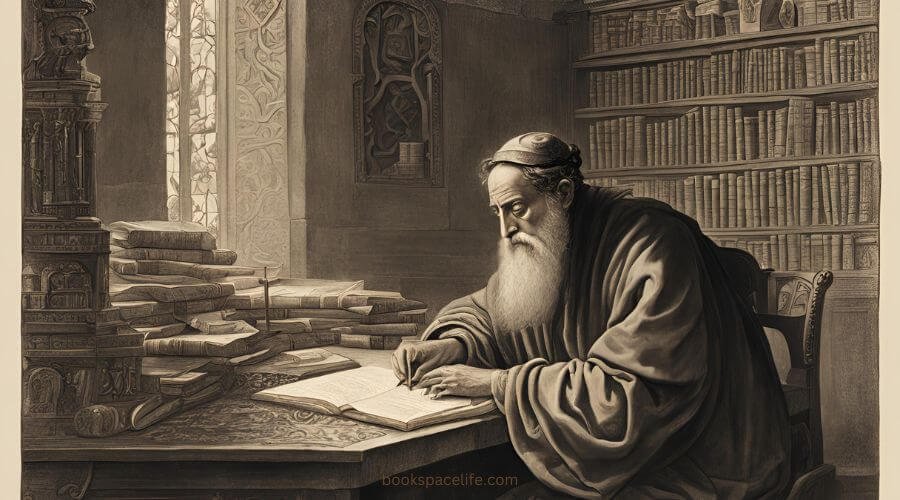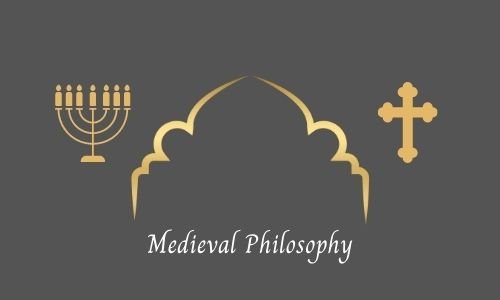Philo of Alexandria
The Philosopher Poet Who Bridged Faith and Reason
Judah Halevi (1075–1141 CE), a renowned Jewish philosopher, poet, and physician, is considered one of the most significant figures in medieval Jewish thought.
Born during a time when the Jewish community flourished under Muslim rule in Spain, Halevi’s intellectual legacy continues to influence Jewish philosophy and literature today.
His unique blend of deep religious faith, philosophical inquiry, and poetic expression resonates with people from diverse backgrounds, making him a pivotal figure in Jewish intellectual history.
Table of Contents
(1) Early Life and Education
Judah Halevi was born in the city of Tudela, in the region of Navarre (modern-day Spain), around 1075 CE, during the time of Muslim rule in Spain, which brought a rich intellectual and cultural environment.
His family was well-established within the Jewish community, and his upbringing reflected the intersection of Jewish tradition with the broader intellectual world of the time.
From a young age, Halevi showed remarkable intellectual abilities and a deep interest in philosophy and theology.
He was educated in Jewish religious texts, primarily the Torah and Talmud, as well as in classical philosophy, Arabic literature, and science.
Spain during this period was a hub of intellectual activity, where Jewish, Muslim, and Christian scholars interacted and influenced each other.
This intellectual fusion had a lasting impact on Halevi’s education and future works.
Halevi’s exposure to the philosophy of Aristotle and Islamic thinkers like Al-Farabi (872 CE to 950 CE) and Ibn Sina (Avicenna 980 CE to 1037 CE) also shaped his intellectual development.
However, his education did not solely focus on secular thought; it was grounded in Jewish tradition, which formed the core of his philosophical inquiries.
This blending of Jewish and Islamic philosophy gave rise to a worldview where Halevi sought to harmonize reason with religious devotion.
(2) Travels and Life Experiences
While Halevi’s early life in Spain was filled with academic and intellectual pursuits, he later undertook extensive travels, which would significantly influence his work and worldview.
In his youth, he spent time in Córdoba, a city that was a major center of learning and culture, and one where Jewish philosophers, poets, and scientists flourished.
His travels, however, were not limited to Spain. Halevi’s intellectual journey took him beyond his native land, with one of his most significant decisions being his pilgrimage to the Land of Israel.
Halevi’s longing for the Land of Israel was a central theme in both his life and work. He believed that the return to the Holy Land was an essential part of the Jewish people’s spiritual and national destiny.
This desire was so deeply ingrained in him that he eventually decided to leave Spain for the Land of Israel.
The decision to undertake such a perilous journey reflects the deep faith and commitment that characterized Halevi’s worldview.
Unfortunately, it is believed that he died on his way to Jerusalem, a tragic end to a lifelong pursuit of spiritual connection to the land that he held in such high regard.
While Halevi’s travels were not extensive in terms of geographic locations, his journey to Israel represents an ideological journey as well.
His travels in the intellectual world led him to embrace a philosophy that emphasized the importance of faith, spirituality, and the Jewish connection to the divine and the land.
(3) Philosophical and Religious Contributions
Judah Halevi’s philosophical writings are rooted in a tension between reason and faith. His most famous work, The Kuzari, is a philosophical dialogue in which the protagonist, the King of the Khazars, engages in a debate with a Jewish philosopher about the nature of Jewish belief, God, and the role of religion in the life of the individual and the community.
The dialogue is framed as an explanation of why Judaism, as opposed to the rationalist philosophies of Aristotle or the polytheistic religions, is the true and divinely revealed faith.
In The Kuzari, Halevi presents a strong defense of Judaism, advocating that it is based on a direct revelation of God to the Jewish people.
The dialogue structure of The Kuzari serves as an effective vehicle for Halevi to counter the rationalist thought that was prevalent in the Islamic world at the time, particularly the views of Aristotle and his Islamic commentators.
Halevi is not dismissive of reason; however, he sees it as subordinate to divine revelation. In this sense, The Kuzari is both a work of philosophy and theology, addressing the nature of God, the legitimacy of Jewish practices, and the superiority of Jewish belief in the face of rationalism.
Halevi’s philosophy focuses on the idea that the Jewish people have a unique, divinely inspired connection to God that cannot be understood purely through rational analysis.
He emphasized the importance of religious experience and faith over intellectual inquiry, arguing that the Jewish people’s survival and continuity through history was proof of their special relationship with the divine.
For Halevi, the truth of Judaism was not found through logic alone but through the lived experience of faith, revelation, and connection to God.
Moreover, Halevi’s works also explored Jewish identity and the central role of Jerusalem in Jewish spirituality.
He was deeply concerned with the exile of the Jewish people and the loss of their homeland. For Halevi, returning to Jerusalem was not just a physical journey but also a spiritual quest to reconnect with God.
This idea of the centrality of the Land of Israel and the spiritual importance of Jerusalem would continue to influence Jewish thought in the centuries that followed.
Poetry: A Reflection of Faith and Identity
In addition to his philosophical works, Judah Halevi was an accomplished poet. His poetry, often written in Hebrew, was deeply intertwined with his religious and philosophical ideas.
Halevi’s poems are known for their profound expression of yearning for the Land of Israel, as well as their reflections on Jewish identity, faith, and the longing for redemption.
Many of Halevi’s poems were written as prayers, meditations, or expressions of love for God and the Jewish people.
His famous poem, Zion, Will You Not Ask for Peace (Zion Tish’ali), speaks of the pain of exile and the hope for the redemption of Israel.
His lyrical work often blended spiritual longing with philosophical reflections, encapsulating his dual role as both a philosopher and poet.
Through his poetry, Halevi gave voice to the Jewish experience of exile, evoking themes of longing, faith, and the hope for ultimate redemption.
His poems are still recited in Jewish communities today, particularly during the High Holidays, as expressions of Jewish longing for a return to the Holy Land and the rebuilding of the Temple.
(4) Legacy and Influence
Judah Halevi’s impact on Jewish philosophy, theology, and poetry is profound. His emphasis on faith, divine revelation, and the unique relationship between God and the Jewish people has influenced Jewish thought through the ages.
His opposition to excessive rationalism and his prioritization of religious experience and revelation found resonance in later Jewish thinkers, such as Moses Maimonides and even Hasidic thinkers, who sought to balance reason with heartfelt spirituality.
Halevi’s emphasis on the importance of the Land of Israel also had lasting effects on Jewish thought. His vision of a spiritual and national redemption would be echoed in later Zionist thought, particularly in the 19th and 20th centuries.
In fact, Halevi’s love for the Land of Israel and his longing for a return to Jerusalem can be seen as an early expression of Zionism, a movement that would later take on political and national dimensions.
As a poet, Halevi’s works continue to be celebrated as some of the finest expressions of Jewish liturgical poetry (piyyutim).
His ability to blend philosophy, theology, and poetry left an indelible mark on the development of Jewish religious and cultural life.
(5) Conclusion
Judah Halevi’s life and work offer a rich and nuanced contribution to Jewish philosophy, theology, and poetry.
His philosophical writings, especially The Kuzari, remain foundational texts for understanding the intersection of faith and reason in Jewish thought.
His poetry, which beautifully captures the spiritual yearnings of the Jewish people, continues to inspire Jewish communities around the world.
Through his writings, Halevi not only defended the uniqueness of Jewish belief but also articulated a vision of Jewish identity and redemption that resonates to this day.








